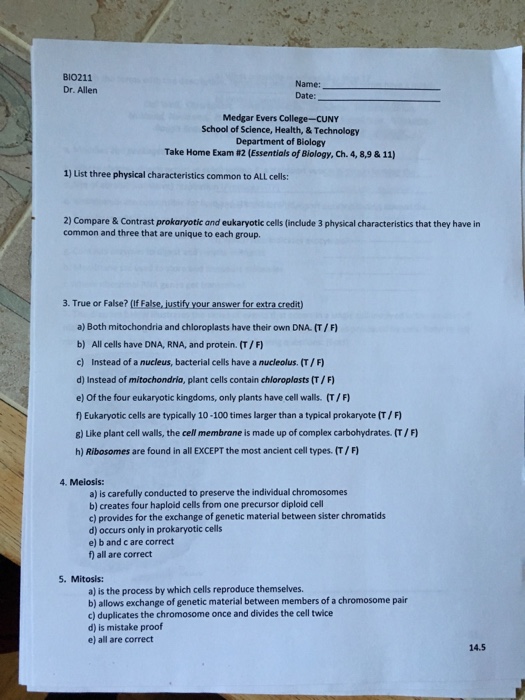Question: List three physical characteristics common to ALL cells: 2) Compare & Contrast prokaryotic and e…

Show transcribed image text List three physical characteristics common to ALL cells: 2) Compare & Contrast prokaryotic and eukaryotic cells (include 3 physical characteristics that they have in common and three that are unique to each group. 3. True or False? (If False, justify your answer for extra credit) a) Both mitochondria and chloroplasts have their own DNA. (T/F) b) All cells have DNA, RNA, and protein. (T/F) c) Instead of a nucleus, bacterial cells have a nucleolus. (T/F) d) Instead of mitochondria, plant cells contain chloroplosts (T/F) e) Of the four eukaryotic kingdoms, only plants have cell walls. (T/F) f) Eukaryotic cells are typically 10 -100 times larger than a typical prokaryote (T/F) g) Like plant cell walls, the cell membrane is made up of complex carbohydrates. (T/F) h) Ribosomes are found in all EXCEPT the most ancient cell types. (T/F) 4 Meiosis: a) is carefully conducted to preserve the individual chromosomes b) creates four haploid cells from one precursor diploid cell c) provides for the exchange of genetic material between sister chromatids d) occurs only in prokaryotic cells e) b and c are correct f) all are correct 5. Mitosis: a) is the process by Which cells reproduce themselves. b) allows exchange of genetic material between members of a chromosome pair c) duplicates the chromosome once and divides the cell twice d) is mistake proof e) all are correct
List three physical characteristics common to ALL cells: 2) Compare & Contrast prokaryotic and eukaryotic cells (include 3 physical characteristics that they have in common and three that are unique to each group. 3. True or False? (If False, justify your answer for extra credit) a) Both mitochondria and chloroplasts have their own DNA. (T/F) b) All cells have DNA, RNA, and protein. (T/F) c) Instead of a nucleus, bacterial cells have a nucleolus. (T/F) d) Instead of mitochondria, plant cells contain chloroplosts (T/F) e) Of the four eukaryotic kingdoms, only plants have cell walls. (T/F) f) Eukaryotic cells are typically 10 -100 times larger than a typical prokaryote (T/F) g) Like plant cell walls, the cell membrane is made up of complex carbohydrates. (T/F) h) Ribosomes are found in all EXCEPT the most ancient cell types. (T/F) 4 Meiosis: a) is carefully conducted to preserve the individual chromosomes b) creates four haploid cells from one precursor diploid cell c) provides for the exchange of genetic material between sister chromatids d) occurs only in prokaryotic cells e) b and c are correct f) all are correct 5. Mitosis: a) is the process by Which cells reproduce themselves. b) allows exchange of genetic material between members of a chromosome pair c) duplicates the chromosome once and divides the cell twice d) is mistake proof e) all are correct



